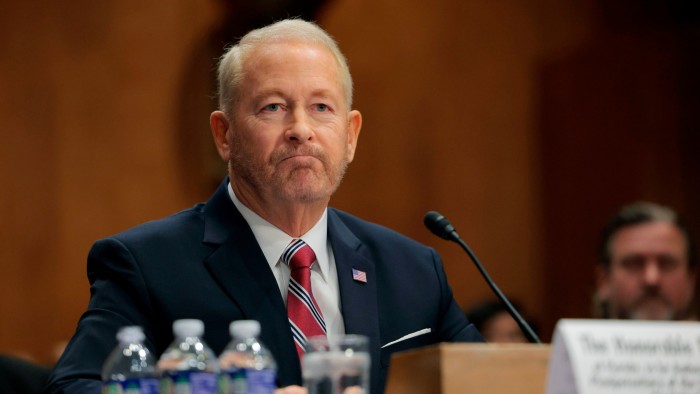Unlock the White House Watch newsletter for free
Your guide to what Trump’s second term means for Washington, business and the world
A former US army colonel arrives on Thursday to start work as his country’s ambassador to Mexico as Washington puts intense pressure on its neighbour to get a grip on violent drug cartels.
Ronald D. Johnson, a former special forces and CIA officer, arrives at a time when US leaders have openly floated the possibility of the first unilateral military intervention in more than a century. Analysts and former officials expect the cartels to be at the top of his priorities.
“His focus will definitely be security, fentanyl, organised crime and migration,” said Lila Abed, director of the Mexico programme at Inter-American Dialogue. “[A] heavy security focus.”
Recent US ambassadors have typically been politicians, lawyers or career diplomats, but President Donald Trump’s pick cuts a strikingly different profile.
During more than a decade in the US military, Johnson served as a green beret in the special forces, known for their unconventional guerrilla tactics. He served in Panama in the early 1980s, before the US invasion in 1989, and also led combat operations in El Salvador during its civil war. In the 1990s he tracked down accused war criminals in the Balkans.
A fluent Spanish speaker, Johnson served as US ambassador to El Salvador during Trump’s first term, where he struck up a close relationship with President Nayib Bukele in the years before the latter began a brutal gang crackdown that slashed the homicide rate.
Asked at his confirmation hearing in March whether the US should consider military action against cartels without Mexico’s consent, Johnson said he would “prefer” to work with Mexico but that “all cards are on the table”.
Similar comments from the Trump team have alarmed some Mexico experts, but others say Johnson’s security expertise could be useful.
“He was effective but discreet in El Salvador,” said Gerónimo Gutiérrez, a former Mexican ambassador to the US. He added that “someone low-profile will probably work better” with Mexico’s current government.
“I prefer a security professional [to] a full Maga ideologue.”
US President Donald Trump has been applying pressure on President Claudia Sheinbaum to accept more US intervention to try to dismantle the cartels. His defence secretary Pete Hegseth said earlier this year that US military action was “on the table”.
Wary of the threat, Sheinbaum has significantly increased arrests and seizures in her first six months in office, and sent high-profile criminals north. This month, however, she said she had rejected an offer from Trump for US troops to operate in Mexico and had told him that “sovereignty is not for sale”.
The US-Mexico relationship revolves around a 2,000-mile border, millions of dual citizens and highly integrated economies undertaking $840bn a year in trade.
For years, the US has put migration at the top of the agenda because of spiralling numbers of irregular crossings via Mexico by migrants from countries around the world.
But after crackdowns in the US and Mexico, this year border crossings have collapsed to their lowest rates in decades. Officials have put more weight behind fighting the cartels that send deadly fentanyl north of the border.
Trump’s tariffs have also made maintaining the US-Mexico-Canada trade deal, USMCA, a priority for Sheinbaum.
“Sheinbaum has made pretty clear that she would like to get a better relationship going,” said Earl Anthony Wayne, former US ambassador to Mexico. “Making sure the trade is working smoothly will be really important . . . he’ll have to help deliver that part of the relationship also if he wants to get her to co-operate on these other areas.”
Security co-operation between the two countries broke down under previous president Andrés Manuel López Obrador, who put strict limits on the work of the US Drug Enforcement Administration.
Previous US ambassador Ken Salazar had focused on maintaining a close personal relationship with López Obrador, until it broke down at the end of his term over López Obrador’s radical overhaul of the judiciary.
“Mexico and the US need a serious reset in security co-operation. An ambassador with [Johnson’s] background will probably interact well with Mexico’s security establishment,” Gutiérrez said.
Johnson’s appointment fits a broader trend towards Latin American experience in the Trump foreign policy team. Secretary of state Marco Rubio is the Spanish-speaking son of Cuban immigrants, while his deputy Christopher Landau is a former ambassador to Mexico.
Source link









